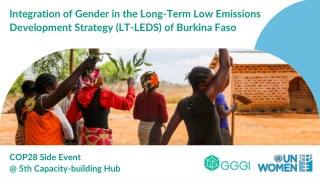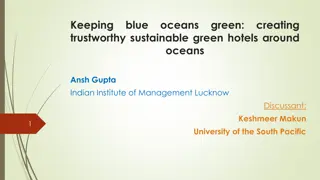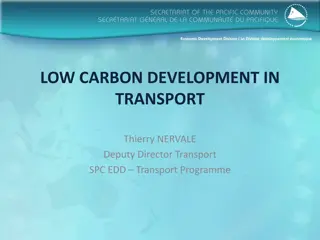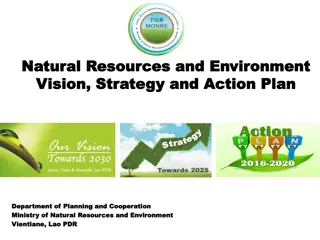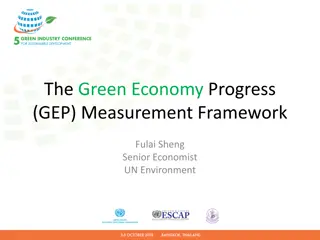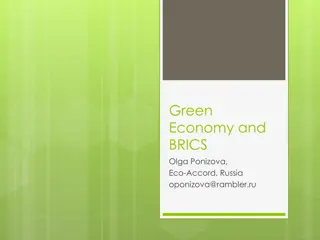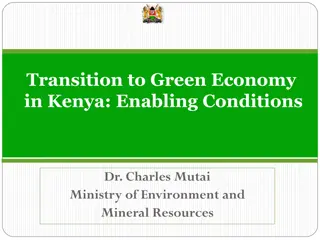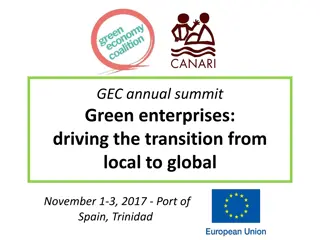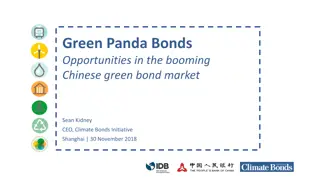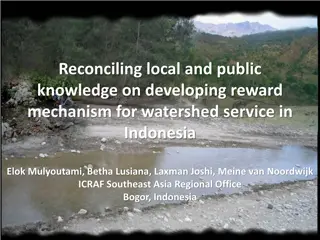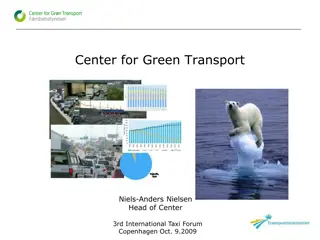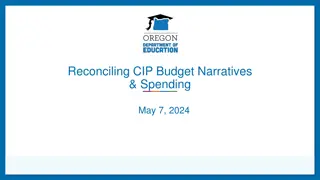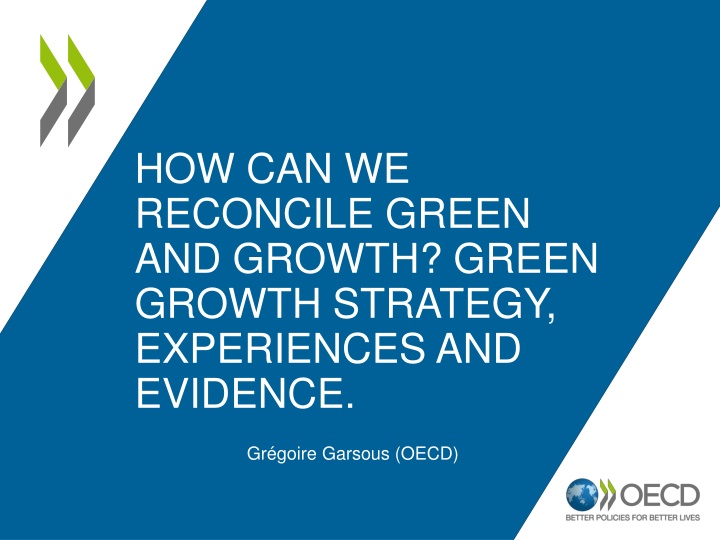
Reconciling Green and Growth: Strategies for Sustainable Development
The economics of green growth show that environmental policies can benefit productivity and trade without hindering competitiveness. New evidence suggests a positive impact on innovative firms with incentives to improve products. Policy challenges include encouraging innovative firms, minimizing barriers to entry, promoting competition, and implementing market-based instruments for sustainability.
Download Presentation

Please find below an Image/Link to download the presentation.
The content on the website is provided AS IS for your information and personal use only. It may not be sold, licensed, or shared on other websites without obtaining consent from the author. If you encounter any issues during the download, it is possible that the publisher has removed the file from their server.
You are allowed to download the files provided on this website for personal or commercial use, subject to the condition that they are used lawfully. All files are the property of their respective owners.
The content on the website is provided AS IS for your information and personal use only. It may not be sold, licensed, or shared on other websites without obtaining consent from the author.
E N D
Presentation Transcript
HOW CAN WE RECONCILE GREEN AND GROWTH? GREEN GROWTH STRATEGY, EXPERIENCES AND EVIDENCE. Gr goire Garsous (OECD)
Introduction: The economics of green growth Economic cost of climate change is estimated around 0.7% - 2.5% of global GDP in 2060 (OECD, 2015) Social cost of air pollution in OECD equivalent to 4% of GDP (OECD, 2014) Little doubt that there are benefits of tighter environmental policies (e.g. global action on climate change) So, why is it so slow? 2
Introduction: The economics of green growth Policymakers fear that environmental policies be a constraint on competitiveness Some empirical studies point to environmental policies as a reason for the 1970s slowdown in the US (Kozluk & Zipperer, 2014) Yet new evidence suggests that environmental policies do not need to hamper growth 3
Reconciling green and growth Environmental policies do not need to hurt productivity (Albrizio et al., 2014) Effect of average EPS tightening on MFP growth 4
Reconciling green and growth Environmental policies do not hurt overall trade (preliminary results from Kozluk & Timiliotis, 2015) 5
Reconciling green and growth Main lessons from new empirical analysis Most productive firms/industries gain from tighter environmental policies Environmental policies can create incentives to innovate and improve their products (i.e. Porter Hypothesis? ) The least productive firms might need to invest more or stop operating However, if resources are reallocated to young and innovative firms, overall impact can be positive 6
The challenges of green growth Framework policies must encourage growth of innovative firms, new products and ideas Competition: minimise barriers to entry & bias towards incumbents, improve access to financing, promote trade and innovation Flexibility: market-based instruments (e.g. pollution taxes) leave firms the choice how to comply 7
The challenges of green growth Tighter environmental policies can be designed to minimise anti-competitive barriers (Albrizio et al., 2014) A. World Economic Forum perceived environmental policy stringency B. Environmental policy stringency proxy (OECD, de jure) WEF perceived EPS (2012) OECD EPS (de jure, 2012) 5 7 DNK CHE DEU NLD AUT DNK SWE JPN NOR NLD 4 6 NZL More stringent environmentalpolicies CHE More stringent environmental policies NOR SWE AUT DEU AUS IRL BEL ESP GBR ISL JPN USA EST POL SVK CZE PRT CAN FRA 3 5 SVN GBR HUN ISR ESP POL FRA AUS SVK ZAF KOR KOR CHL ITA CAN HUNITA BEL HRV PRT GRC MEX USA 2 4 TUR GRC IRL 1 3 0,5 1 1,5 2 2,5 3 3,5 4 4,5 0,5 1 1,5 2 2,5 3 3,5 4 4,5 Total BEEP indicator Policies more burdensome to entry and competition Total BEEP indicator Policies more burdensome to entry and competition 8
The challenges of green growth in Belgium: coordination Another challenge is the alignment of other (non-environmental) policies In Belgium, a better coordination between fiscal and environmental policies is needed Subsidies to company cars conflict with objectives of air pollution reduction About 6000 deaths from air pollution in Belgium in 2010 (OECD, 2014), one of the poorest population exposure to PM figures in OECD 9
The challenges of green growth in Belgium: coordination High subsidies have increased CO2 emissions of transport (OECD, 2013) 10
The challenges of green growth in Belgium: coordination Congestion is also a coordination failure among regions in Belgium Brussels area bears the costs of suburban commuting Other coordination failures, e.g. the strategy for development of renewables 11
Concluding remarks Green growth is possible However, policies design matters a lot Competition and flexibility to facilitate adjustment through innovation, adoption, dynamism Social policies to smooth adjustment Coordination crucial for efficient policies 12
References OECD (2015): The economic consequences of climate change, OECD Publishing OECD (2014): The costs of air pollution: health impacts of road transport, OECD Publishing OECD (2013): Better use of infrastructures to reduce environmental and congestion costs, in OECD Economic Surveys: Belgium 2013, OECD Publishing Albrizio, S., T. Kozluk and V. Zipperer (2014): Do environmental policies matter for productivity growth? Insights from new cross-country measures of environmental policies, OECD Economics Department Working Papers, No. 1776, OECD Publishing T. Kozluk and V. Zipperer (2014): Environmental Policies and Productivity Growth: a critical review of empirical findings, OECD Economics Department Working Papers, No. 1096, OECD Publishing T. Kozluk and C. Timiliotis (2015): Do environmental policies affect global value chains? A new perspective on the pollution haven hypothesis, Forthcoming in OECD Economics Department Working Papers 13

